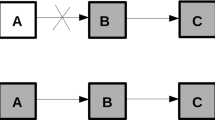Abstract
The paper proposes a solution to the problem of counterfactuals, building on both Rescher’s epistemic and Tichý’s semantic approaches. The core of the proposed solution is the thesis that when expressing a true counterfactual, the speaker assumes a set of background indicative premises as an implicit parameter. When added tacitly to an unreal antecedent, these premises entail the consequent logically or analytically. We draw a distinction between a potentially unreal and an absolutely unreal condition expressed in the antecedent. We view counterfactuals with a positive time vector and an absolute unreal condition as abbreviated deductive retrodictions. Similarly, we consider counterfactuals with a potentially unreal condition to be abbreviated deductive predictions. In a similar manner, we also explain the truth (falsity) of vacuously true counterpossibles or counterpossible conditionals. In the second part, we discuss the enigmatic backtracking counterfactuals. We propose that their negative time direction is due to their being abductive retrodictions, i.e., explanations of unreal effects based on possible causes in which the conditions remain tacit or unexpressed. The backtracking temporal direction of counterfactual abductive retrodictions is in accordance with the thesis on the positive temporal direction from cause to effect. Thus, we demonstrate that in order to explain backtracking counterfactuals, there is no need to assume violations of laws of nature or a special logic. What we need to do is to take into account the third parameter, i.e., a set of tacit or unexpressed additional propositions, as well as the principle of ceteris paribus as the background.
Similar content being viewed by others
Notes
Rescher (2007, p. 175).
Rescher (2007, p. 74).
In this paper, absolute unrealness is only related to causality.
The paper, “General Propositions and Causality” was written in 1929 and published posthumously.
“It is not true that if it were true that …, then it would not be true that…”.
Tichý investigates a more adequate notation of events in (Tichý (1980)).
For open propositional constructions, Tichý suggested preserving the lambda binding of variables: λw λt. A╞B. Duží et al. (2010, 414ff.) analyse cases such as these.
Walters (1961, p. 43) believes that the use of the conditional mood in an implicational statement indicates that the statement is an argument.
Examples are taken from Sendłak (2021, 7283).
An overview of the different explanations proposed can be found in Sendłak (2021).
References
Adams EW (1970) Subjunctive and indicative conditionals. Found Lang 6:89–94
Adams EW (1988) Modus tollens revisited. Analysis 48(3):122–128
Arregui A (2009) On similarity in counterfactuals. Linguist Philos 32(3):245–278
Ayer A (1956) The Problem of knowledge. Penguin Books, Harmondsworth
Bennett J (2003) A philosophical guide to conditionals. Oxford University Press, Oxford
Berto F, Jago M (2018) Impossible worlds. In: Zalta EN (ed) The Stanford encyclopedia of philosophy (fall 2018 Edition, accessed of 20.01.2021). https://plato.stanford.edu/entries/impossible-worlds/
Black M (1956) Why cannot an effect precede its cause? Analysis 16(3):49–58
Chisholm RM (1946) The contrary to fact conditional. Mind 55(220):289–307
Chisholm RM (1955) Law statements and counterfactual inference. Analysis 15:97–105
Comrie B (1986) Conditionals: a typology. In: Traugott EC, Meulen A, Reilly JS, Ferguson CA (eds) On conditionals. Cambridge University Press, Cambridge, pp 77–99
Downing P (1956) Subjunctive conditionals, time order, and causation. Proc Aristot Soc 59:125–140
Dummett M (1954) Can an effect precede its cause? Aristot Soc. https://doi.org/10.1093/aristoteliansupp/28.1.27
Duží M, Jespersen B, Materna P (2010) Procedural semantics for hyperintensional logic. Foundations and applications of transparent intensional logic. Springer, Dordrecht
Fischer T (2016) Counterlegal dependence and causation’s arrows: causal models for backtrackers and counterlegals. Synthese. https://doi.org/10.1007/s11229-016-1189-7
Gahér F (2022) Deductive and abductive predictions and retrodictions (forthcoming)
Goodman N (1947) The problem of contrafactual conditionals. J Philos 44(5):113–128
Hiddleston E (2005) A causal theory of counterfactuals. Noûs 39(4):632–657
Lewis D (1973) Counterfactuals. Blackwell, Oxford
Lewis D (1979) Counterfactual dependance and time’s arrow. Noûs 13(4):455–476
Lewis D (1976) The paradoxes of time travel. Am Philos Q, 13:145–152. In: Lewis 1986a, 67–80.
Lewis D (1986a). Events. In: Lewis 1986a, 241–269.
Lewis D (1986b) Philosophical papers II. Oxford University Press, Oxford
Lycan WG (2001) Real conditionals. Clarendon Press, Oxford
Nute D, Cross C (2001) Conditional logic. In: Gabbay DM, Guenthner F (eds) Handbook of philosophical logic, vol 4, Kluwer, Dordrecht, pp 1–98
Palmer F (2001) Mood and Modality (1986 first edition). Cambridge University Press, Cambridge
Pollock J (1976) Subjective reasoning. Reidel, Dordrecht
Pollock J (1981) A refined theory of counterfactuals. J Philos Log 10:239–266
Ramsey FP (1931) The foundations of mathematics and other logical essays. In: Braithwaite RB (ed) Kegan, Paul, Trench, Trubner & Co., London (reprint 2013, Martino Publishing, Masfield Centre, CT)
Rescher N (2007) Conditionals. A Bradford book. The MIT Press, Cambridge
Rips L (2010) Two causal theories of counterfactual conditionals. Cogn Sci 34:175–221
Sendłak M (2021) Counterpossibles, story prefix and trivialism. Synthese 199:7283–7301. https://doi.org/10.1007/s11229-021-03114-7
Schiffrin D (1992) Conditionals as topics in discourse. Linguistics 30(1992):165–197
Schwenter SA (1998) The pragmatics of conditional marking: implicature, scalarity, and exclusivity. Doctoral dissertation, Stanford University
Sider T (2010) Logic for philosophy. Oxford University Press, Oxford
Stalnaker R (1968) A theory of conditionals. In: Rescher N (ed) Studies in logical theory. Basil Blackwell, Oxford, pp 98–112
Svoboda V, Jespersen B, Cheyne C (2004) Pavel Tichý’s collected papers in logic and philosophy. University of Otago Press, Dunedin
Tichý P (1976) A counterexample to the Stalnaker-Lewis analysis of counterfactuals. Philos Stud 29:271–273
Tichý P (1978) A new theory of subjunctive conditionals. Synthese 37:433–457
Tichý P (1980) The semantics of episodic verbs. Theor Linguist 7:263–296
Tichý P (1984) subjunctive conditionals: two parameters vs. three. Philos Stud 45:147–179
Walters RS (1961) The problem of counterfactuals. Australas J Philos 39:30–46
Funding
Funding was provided by by the Science Grant Agency VEGA (Grant No. 1/0197/20) and the Slovak Research and Development Agency (Grant No. APVV-17-0057).
Author information
Authors and Affiliations
Corresponding author
Additional information
Publisher's Note
Springer Nature remains neutral with regard to jurisdictional claims in published maps and institutional affiliations.
Rights and permissions
About this article
Cite this article
Gahér, F. Counterfactuals and Backtracking Counterfactuals. Axiomathes 32 (Suppl 2), 553–573 (2022). https://doi.org/10.1007/s10516-022-09618-2
Received:
Accepted:
Published:
Issue Date:
DOI: https://doi.org/10.1007/s10516-022-09618-2




